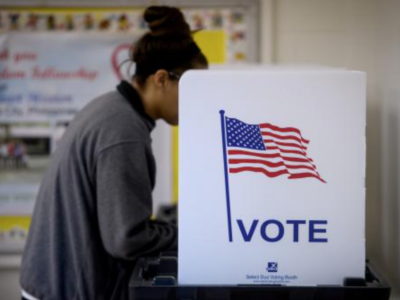The cherry on top of a wild year: an election. Just when we thought 2020 couldn’t get any weirder, we now have to make decisions that will impact our lives for many years to follow. However, instead of viewing this election as another stressful thing this year threw our way, look at it as an opportunity to enact change. Voting gives us a unique chance to make our voices heard, not only when deciding who will sit in the Oval Office, but also within our smaller local communities.
We need to take this opportunity to vote and vote smart.
“But why… my vote doesn’t matter.”

A common misconception with a General Election is that people feel their vote for president doesn’t matter if they happen to live in a historically red or blue state. However, that cannot be further from the truth. In 2000’s Bush v. Gore Presidential Election, the infamous “hanging chads” of Palm Beach County, Florida, caused a vote recount that came down to the wire. Though no one could have predicted this issue, it just goes to show how important your singular vote is.
In addition, every ballot across the country has local elections to vote for, too. You plan to vote for the next president, but you may also be voting for your senator, circuit judge, sheriff or tax collector. These seemingly small jobs make a huge impact in your immediate community, so don’t write them off.
In addition, we have the unique opportunity to participate in a democracy. “It’s not only about who you vote for or if your candidate wins, it’s about exercising your right to vote as an American,” said Stevens Institute of Technology senior Matt Gordon. “Not everyone in the world (or even the U.S.) can vote, so it’s very important for those who can exercise their civic duty.” We are very lucky to have a chance to make our voices heard, especially during times of global crisis. Your vote matters now more than ever.
“I’ve only seen negative things on social media.”

Though entertaining, social media can be a toxic experience, especially given the current political and social climate of the world. “There is a lot of anxiety surrounding the pandemic, school and the election (rightfully so), and a lot of it is coming from social media,” said New York University junior and Public Health Ambassador Emily Escobar. “People are going to have their opinions whether you agree with them or not, so feel free to mute, unfriend or block the people that are not benefitting your social media presence.” In addition to toxicity, beware of groupthink and confirmation bias; if your feed only reflects your specific values, you aren’t getting the whole story!
Try broadening your news sources by following different stations, and don’t just rely on social media for all the facts. If you fill your feed with multiple perspectives, you will have the ability to formulate your own opinions about what happens in our world, rather than allow the mindless scrolling to fully take over your thoughts. Some great resources to help you in your pursuit of current events include:
- AllSides: A website dedicated to identifying bias within different news sources. Check the Media Bias Chart for a comprehensive list of popular sources’ political leanings, spanning from left to right. They also have a link available that puts voters in touch with election-specific resources, such as a policy stance tracker for each candidate’s platform, fact-checking and news coverage.
- Ad Fontes Media: “Ad Fontes” is Latin for “the source,” and also the root of this resource’s efforts. This website has the Media Bias Chart, a ranked spectrum to identify news sources’ political leanings. The spectrum groups sources in one of four categories: Most Reliable, Mixed Reliability, Somewhat Reliable and Unreliable. In addition, the chart features a scale of unbiased content reliability, ranging from Original Fact Reporting to Propaganda.
“There’s just so much research… I don’t know where to start!”

I agree, you do have a lot of research ahead of you. Luckily, the internet offers TONS of resources to help you figure out which candidate(s) you want to vote for. “I think being a ‘smart’ voter entails taking the time to actually understand the policies and results that would come from any candidate you choose to vote for,” said New York University junior Brett Cohen. “I’m registered to vote in Arizona, so I just googled ‘Arizona voter guide’ and found an excellent overview of most state elections made by the state.” Something as seemingly easy as a quick Google search can unlock all the answers you need to make informed voting decisions.
In addition, pay attention to your local news sources. “In my experience, I’ve found it helpful to tune into my local newspaper during elections; it often has lots of resources about specific candidates and their platforms,” said Yale University junior Juanita Garcia. Pay attention to all the resources around you in order to make informed decisions. If you still feel stuck on where to look, check out some extra resources to stay informed:
- Vote Save America: This website is your one-stop-shop for all the information and tools you need to participate in the 2020 election. One particularly useful feature is “Build Your Own Ballot”, an interactive tool to help you learn about everything on your ballot in your state. You can even save it as a reference for when you cast your real ballot.
- Rock the Vote: Founded by music executives in 1990, this initiative has activated and inspired millions of young people across the country to exercise their rights and represent their interests. Notable resources include COVID-19 election information, specific states’ dates and deadlines and how you can get involved to inspire others to join the movement.
“I’m scared to go out and vote during this pandemic… what should I do?”

We see you and we hear you; this pandemic is no joke, and safety precautions should always rank at the top of your priorities. “Safe voting means having a voting plan. Personally, I requested an absentee ballot and made sure to mail mine early,” said Escobar. That being said, you have plenty of safe ways to cast your vote.
- Early Voting: By now, most states began their Early Voting process, meaning voters have the options to cast their ballot before Election Day. If you want to avoid crowds, then take advantage of this opportunity. You can research your state’s specific Early Voting guidelines here.
- Absentee/Vote By Mail: For anyone who can’t travel home for Election Day, you can elect to Vote By Mail. That being said, if you haven’t opted to vote absentee at this point, taking the Early Voting route is probably the better (and timelier) option. The last thing you want is to have your ballot left uncounted because it arrived too late. If you live close enough to your polling place where you can drop your filled out absentee ballot, by all means go for it, but for future reference please allow for at least two weeks of buffer time when mailing from out of state.
“Ok! I’m ready to make a difference!”

The election isn’t on November 3rd, it ends November 3rd. You have the power to make your voice heard and enact change for the better. We spent the past 10 months of this year inside, anxious about the uncertainty and division in our country. Now, we have the chance to take matters into our own hands and vote for a brighter, smarter and kinder future.



















